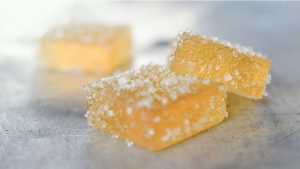
(This is an abridged version of a story that appears in the August issue of Marijuana Business Magazine.)
Azuca, a CBD-infused product manufacturer headquartered in New York City, is using tiny, infused sugar granules as the building blocks for its rapidly growing cannabis business.
The company’s CBD-infused sugars and syrups can be stirred into batters, doughs and drinks. The company also has infused flakes for savory items.
Founded in 2018 by chef Ron Silver, who owns Bubby’s restaurant in New York City, Azuca markets itself as “a culinary technology cannabis company.” It also makes THC-infused products.
CEO and co-founder Kim Rael describes Azuca as a technology cannabis company dedicated to solving edibles’ main problem: the difficulty of proper dosing.

Kim Rael
“We like to say size matters, and smaller is better,” she said. “If our molecule was the size of a marble, the competitive technologies out there are the size of a large beach ball.”
The three patents filed in 2017 and another filed by the company this year center on making the cannabinoid molecules small and water friendly, or hydrophilic, so the body can quickly absorb the chemicals and start to feel the effects of CBD or THC.
Quicker absorption means consumers won’t have to wonder when they’ll start to feel the effects of edibles. That could help reduce the risk people will consume more CBD or THC than they expected.
The result of Azuca’s technology – infused syrup, sugars and flakes – can easily get lost inside the edibles that are created.
While discussing the challenge of building a brand around products that will be hidden inside their final destinations, Rael pointed to two well-known companies – the sugar substitute Splenda and semiconductor chip maker Intel Corp.
Splenda is sold as a stand-alone product for those looking for a sugar substitute for their tea or coffee.
But the maker of Splenda, the Heartland Food Products Group, also partners with brands such as Coca-Cola on products such as Diet Coke that include Splenda, where the sweetener logo appears on the can.
Similarly, Intel – where Rael previously managed a $200 million capital budget – has built a brand on ensuring consumers know their Lenovo, HP and Dell laptops are “powered by Intel” hardware.
“That’s the model we’re using with our technology,” Rael said.
The company sells direct to consumers online as well as making wholesale sales of its infused ingredients to other manufacturing companies.

